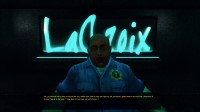Vampire: the Masquerade - Bloodlines
Playtime: 33.0 Hours
Finished 16 April 2023.Finished a single playthrough as a female Toreador, with most stats focused on high seduction & persuasion, and also ending up with high hacking and lockpicking stats. Generally a lesser focus on stealth and weapons, though I did end up getting maxed ranged very close to the end of the game (around Sabbat HQ). Maxed Auspex, Level 4 Celerity, very low Str/Dex/Sta stats made the endgame a bit tougher than it needed to be, probably. Interested in doing at least a second playthrough as a Malkavian, but I enjoyed this game enough to do multiple subsequent playthroughs honestly.
I really wish I had played this sooner, because I love this game; how it depicts a slightly more realistic, grounded view of vampire society where maintaining a "Masquerade" of humanity is important, the depiction of different factions and power struggles, and especially the gameplay. It's been a while since I've played an immersive sim that gave me a feeling this similar to my first playthrough of Deus Ex. The game encourages extensive customization of your character - given that it's based on a tabletop RPG (Vampire: the Masquerade), there is a lot of thought and balance put into making each character "class" very distinct from all others, from more "standard" Toreadors and Ventrues, to brawling Gangrels, insane Malkavians and hidden Nosferatus. While not without flaws (not by a long shot, actually - it's horrendously janky in places and plainly unfinished), it's a game that I absolutely must play again sometime.
As far as the setting of the game goes, this game takes place in the well-established universe of Vampire: The Masquerade, and thus isn't forced to manufacture some world-ending conspiracy or apocalyptic scenario to give some arbitrary sense of urgency - which often ironically makes the world feel shallow and empty. The game follows a more contained storyline within the universe, focused entirely on a series of major events in LA into which the player character, or "fledgling" is thrust into when they are suddenly sired as a new vampire and inducted into the hidden society. I don't have any idea how many (if any) of the characters are taken from the wider lore of VtM, or if they are all original to this story arc in LA, but the writing and acting is absolutely top-notch. Jack and Sebastian give you a very good look into what the world has to offer; not only are their characters very strong, they also do a great job at representing the general attitude of the Anarchs and the Camarilla respectively. Each area also has no shortage of fun and memorable characters, of which there are far too many to keep count; Jeanette/Therese in Santa Monica, Gary in Hollywood, etc. With so much of this game being focused on the immersion of your character in an unfamiliar LA nightlife scene, even minor characters in sidequests are given a surprising amount of personality that persists through the game. For example, Arthur Kilpatrick is a bail bondsman who gives a couple of early game side quests, and is not an important character at all; yet later in the game you can use his PC to get some information on another quest, and a net cafe in Hollywood has information on his porn habits. The amount of detail and attention paid to flesh out the lives of everyone you meet to this degree in this game is uncommon even today. My main complaint about the characters you encounter is simply an issue with scale - representation of clans is somewhat lopsided, with Nosferatus in particular being extremely overrepresented within the NPCs of the game. That said, there are few visible members of all the clans, so it's mostly a problem with not having the time to create so many characters.
Speaking of side characters and quests, the overall structure of the quests and plot in this game differs from Deus Ex quite a bit, in that this game more heavily leans into a "traditional" RPG flow of main and side quests. What that means is although the scale of the hubs and areas in VtMB is quite a bit smaller than Deus Ex, the sidequests are far more extensive in nature. The ability for you to travel at will between the different hubs in this further extends the possibilities - quests like the Serial Killer take you on a manhunt across three of the 4 main hubs. For a while, I actually thought that it was part of the main quest. Just like that quest, there are several other standout quests that help to make the entire world memorable, not just the main plot. Quests like the haunted hotel and the 9th Circle cult plotline draw out some horror elements that you would typically expect in a game about vampires and night creatures. Another plus is that lots of quests have a lot of dialogue, and tend to have many possible approaches which differ by clan. Speech skills are extremely useful for less gorilla-brained playthroughs, as you can talk your way out of many bad situations and into many more good ones. However, I did notice that there was a massive preference towards the Persuade skill, which is head over heels more useful than the others (Seduce, Intimidate, Haggle). I played a high seduction Toreador which ended up being very fun due to the more raunchy dialogue, but the important skill checks were still mostly Persuade. I'm interested in seeing what the Malkavians and Ventrues can do with their Dementate and Dominate skills - I think those unlock special options in certain scenarios, which promises to be interesting. My only other minor issue with the game is again due to the scale of the final product; you can kind of tell when the quests are done in an area when you've entered every building in the zone - as they didn't have enough time to create any pointless facades or houses just for worldbuilding.
The character building is about as interesting as it is janky in this game. All points allocated towards stats or disciplines is measured in EXP, granted through progressing in quests or occasionally in exploring an area. Points are usually granted at multiple points in many quests, and the amount awarded varies pretty greatly between the different resolutions you achieve; though there's never really a good gameplay tradeoff for being a more villainous character unfortunately. Stats are split into a ton of different categories across a list of attributes and a list of abilities, but each trait that really matters to your character (like ranged combat skill, hacking, etc.) tend to be tied to 2 different stats - one attribute and an ability. I found this pretty confusing, and I'm still not really sure what the motivation for the split is... though there are a few skill books or trainers that can level up your abilities. However, both attributes and abilities are leveled using EXP in the same way, and point costs are also similar which makes the distinction feel a bit redundant, at least in this game. It's also worth noting that experience points earned suddenly spike up near the end of the game for seemingly no good reason. The first couple of hubs are a massive struggle to find points for necessary levels, whereas some extremely basic tasks or checkpoints near the endgame can give you 2-3 times as much for much less. As an example, the sewer level in the midgame involves hours of killing various Tzimisce flesh golems and only rewards 2XP, a pittance. Later, a series of 3 conversations between 2 old and retired Chinese hitmen grants a full 6XP for maybe 5 minutes of talking. This rearloading of much-needed experience points makes the game always feel a bit inaccessible, as throughout the entire game there will are doors that are difficult to pick, or computers I can't hack, or any number of other restrictions stemming from a simple lack of skill points. And that's not even to mention the fact that your combat capability and powers (disciplines) also require points to level as well...
Continuining from above, the combat in this game isn't a great system, but it also falls victim to the skill system. Because this highlights of this game are primarily centered around the dialogue options and other alternative quest resolutions, I prioritized important non-combat skills like persuade, seduce, security, and hacking above combat traits. This ended up making some of the forced combat scenarios in the game much harder, which I regret somewhat. However, no matter the situation, the combat is still not particularly good - I'd consider it a competent system at best, at least for guns. This game uses an accuracy system similar to Deus Ex, where you need to stand still or crouch for the reticle to slowly shrink. The way that the guns are tuned means that it takes about 70% of the game before weapons truly feel satisfying to use, unlike DX where you can quickly master a weapon type like pistols in the first few levels alone. The design of missions is also very unbalanced as far as combat goes. Many missions will require you sneak around and avoid killing, and a few require you to completely exterminate massive building complexes, but there are almost no parts of the game that strike a balance in between the two. Not to mention, the few boss fights in this game are also pretty awful too. Since my only playthrough so far has been with a gun-heavy build (and my next planned one as a Malk will similarly use guns), I can't confidently say much about a melee or unarmed build, but from the little melee combat I've done it's not very good either, and apparently runs into balancing problems later on.
The last thing worth mentioning in a brief overview of the game is that the ending is extraordinarily anticlimactic with no possibility of a satisfying payoff, and it is beyond obvious that this game was only half-baked when Troika had to release it; the development process of this game dragged to the point where the lukewarm reception at release ended up dragging Troika under not long after. The events of the ending (no matter which path you take) clearly indicate that the writers had to hurreidly close up all of the plot threads and faction consequences opened in the first 70% of the game or so; in essence, the resolution of every hostile faction is simply for the fledgling to run over to their HQ and slaughter them all. This is true for at least the Sabbat, the Ming, some of the Camarilla, and potentially the Anarchs as well if you chose to be hostile to them; but beyond some of these murder missions the endings don't differ much, and are not impacted by any choices earlier in the game from when you first learned about the Camarilla/Anarch conflict. It feels a bit reminiscent of the WTO and Order faction war in DX:IW, where it turns out both sides were under direct control of the Illuminati. The ending also leaves a number of plotholes related to Jack, the nature of the coffin, etc. for which there is no real answer, and ultimately forms probably the greatest disappointment of the game - and would be a strong reason to dismiss it altogether and not bother considering another playthrough at all, if I didn't enjoy the rest of the game as much as I did. As it stands, it's a major caveat, but hardly a dealbreaker for a game that is otherwise so replayable and intriguing.







